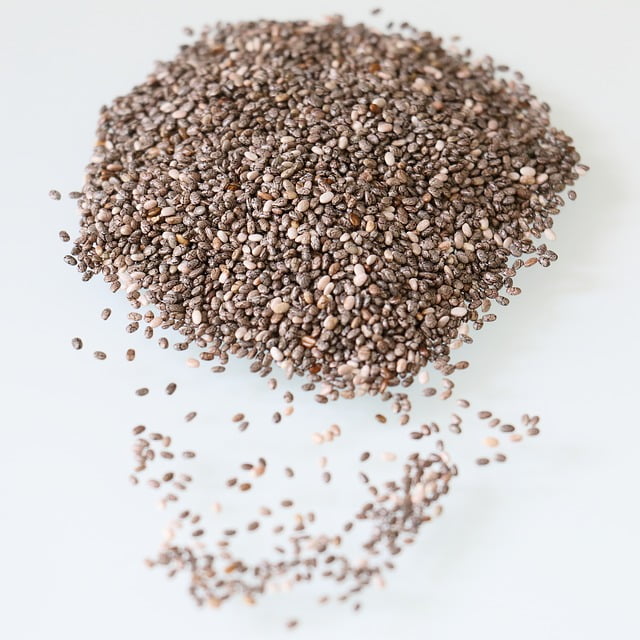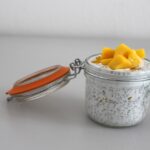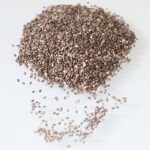
Chia seeds are a versatile and nutritious ingredient that can be added to a wide variety of dishes and beverages. They are a good source of fiber, protein, omega-3 fatty acids, and various minerals and antioxidants. With so many brands and types of chia seeds available, it can be overwhelming to decide which ones to buy.
In this article, we will explore the different factors to consider when choosing chia seeds, including organic versus conventional, whole versus ground, color, country of origin, and the best brands. By understanding these factors, you can make an informed decision about which chia seeds are the best fit for your needs.
- Tips For Buying Chia Seeds
- Which Chia Seeds are Best for Weight Loss?
- Which Country Produces the Best Chia Seeds?
- Which Chia Seeds are Best: Black or White?
- Organic or Conventional Chia Seeds?
- Ground vs. Whole Chia Seeds
- 10 Best Chia Seeds Brands
- Which Chia Seeds to Buy to Grow?
Tips For Buying Chia Seeds
When it comes to choosing chia seeds, there are a few things to consider to ensure that you are getting a high-quality product. While it is not necessary to choose the most expensive or fancy brand of chia seeds, it can be a good idea to pay attention to a few key factors to ensure that you are getting the most out of your purchase.
Here are some tips to help you choose the best chia seeds:
1) Look for certified organic chia seeds
If you are interested in buying organic chia seeds, make sure that the product is certified organic by a reputable organization. This will ensure that the seeds were grown using sustainable and environmentally-friendly methods and are free from synthetic pesticides, herbicides, and fertilizers. Organic chia seeds may also be more nutrient-dense and flavorful, as they are grown using practices that prioritize soil health and biodiversity.
2) Consider the source
If you have the option, it can be a good idea to choose chia seeds that are grown in a location that is known for producing high-quality seeds. For example, chia seeds grown in South America are often considered to be of a high quality. It can be a good idea to do your own research and choose a product from a location that has a reputation for producing high-quality chia seeds.
3) Check the expiration date
Chia seeds have a relatively long shelf life, but they can lose their potency over time. Make sure to check the expiration date on the package to ensure that you are getting a fresh product. Fresh chia seeds are more likely to have a good flavor and a higher nutrient content.
4) Look for packaging that protects the seeds from moisture and light
Chia seeds are sensitive to moisture and light, which can cause them to lose their potency. Look for packaging that is airtight and opaque to protect the seeds from these elements. This will help to ensure that the seeds are fresh and have a good flavor when you use them.
5) Check for any additives or fillers
Some chia seed products may contain additives or fillers, such as sugar or artificial flavors. If you want to get the most out of your chia seeds, look for a product that is pure and free from any added ingredients. This will ensure that you are getting the most out of your chia seeds and that you are not consuming any unnecessary ingredients.
6) Compare prices and read reviews
There are many different brands of chia seeds available on the market, and it can be difficult to know which one to choose. It can be a good idea to compare prices and read reviews from other customers to get a sense of the quality of different brands. This can help you to find a product that is a good value for money and that meets your needs and preferences.
Which Chia Seeds are Best for Weight Loss?
If you are trying to choose chia seeds for weight loss, you will want to still follow the same tips as mentioned above.
If you would like to learn more, see Which Chia Seeds are Best for Weight Loss.
Which Country Produces the Best Chia Seeds?
Chia seeds are native to Central and South America, and they are grown in several countries in these regions. The quality of chia seeds can vary depending on a range of factors, including the growing conditions and farming practices used. Here are a few countries that are known for producing high-quality chia seeds:
- Mexico: Mexico is the largest producer of chia seeds in the world. The climate and soil in Mexico are well-suited for growing chia, and the country has a long history of producing high-quality chia seeds.
- Bolivia: Bolivia is another major producer of chia seeds, and the seeds grown in this country are known for their high nutritional value and flavor.
- Argentina: Argentina is also a significant producer of chia seeds, and the seeds grown in this country are known for their high protein and fiber content.
- Peru: Peru is a smaller producer of chia seeds, but the seeds grown in this country are known for their high quality and flavor.
It is worth noting that the quality of chia seeds can also vary depending on the specific farm or company that produces them. Some companies may use sustainable and environmentally-friendly practices, while others may not. It can be a good idea to do your own research and choose a product that meets your standards for quality and sustainability.
Overall, it is difficult to say which country produces the “best” chia seeds, as the quality of chia seeds can vary depending on a range of factors. However, several countries in Central and South America are known for producing high-quality chia seeds, and it can be a good idea to choose a product from one of these regions if you are looking for a high-quality product.
Which Chia Seeds are Best: Black or White?
Chia seeds are available in two main colors: black and white. Both types of chia seeds come from the same plant (Salvia hispanica) and are nutritionally similar, with a high fiber and protein content, as well as omega-3 fatty acids and various minerals and antioxidants. Here are some key differences between black and white chia seeds:
- Appearance: The main difference between black and white chia seeds is their color. Black chia seeds have a dark, almost black color, while white chia seeds are pale in color. This difference in color is due to the outer shell of the seed. Black chia seeds have a dark outer shell, while white chia seeds have a pale outer shell.
- Nutritional content: Black and white chia seeds have a similar nutritional profile, with only slight differences in some nutrients. For example, black chia seeds may have slightly higher levels of antioxidants compared to white chia seeds. However, these differences are not significant and are unlikely to have a significant impact on your health.
- Flavor: Some people find that black chia seeds have a slightly nuttier flavor compared to white chia seeds, which have a milder flavor. However, the difference in flavor is not significant and is largely subjective.
Overall, the choice between black and white chia seeds is mostly a matter of personal preference. Both types of chia seeds are nutritionally similar and can be used in a variety of dishes and beverages. It is important to choose chia seeds that are pure and free from any added ingredients, regardless of whether you choose black or white seeds.
Organic or Conventional Chia Seeds?
When it comes to choosing between organic and conventional chia seeds, there are a few factors to consider. Both types of chia seeds have similar nutritional profiles, with high levels of fiber, protein, omega-3 fatty acids, and various minerals and antioxidants. However, there are some differences in the way that organic and conventional chia seeds are grown and processed, as well as their potential health benefits.
One key difference between organic and conventional chia seeds is the way they are grown. Organic chia seeds are grown using organic farming methods, which means they are produced without the use of synthetic pesticides, herbicides, or fertilizers. Organic chia seeds are also non-GMO (genetically modified organisms), which means they are not produced using genetic engineering techniques. On the other hand, conventional chia seeds may be grown using synthetic pesticides, herbicides, and fertilizers, and may be produced using genetic engineering techniques.
Another difference between organic and conventional chia seeds is their potential health benefits. Some studies have suggested that organic foods, including chia seeds, may have higher levels of antioxidants and other beneficial compounds compared to conventional foods. This is because organic farming methods may promote the production of these compounds in plants. However, it is important to note that the difference in nutrient levels between organic and conventional chia seeds is not significant and is unlikely to have a significant impact on your health.
Ultimately, the choice between organic and conventional chia seeds comes down to personal preference and your values. Both types of chia seeds are nutritionally similar and can be used in a variety of dishes and beverages. If you are concerned about the environmental and health impacts of synthetic pesticides, herbicides, and fertilizers, or if you prefer to avoid genetically modified organisms, then organic chia seeds may be a good choice for you. It is also important to choose chia seeds that are pure and free from any added ingredients, regardless of whether you choose organic or conventional seeds.
Ground vs. Whole Chia Seeds
Both types of chia seeds have similar nutritional profiles, with high levels of fiber, protein, omega-3 fatty acids, and various minerals and antioxidants. However, there are some differences in the way that ground and whole chia seeds can be used, as well as their potential health benefits.
One key difference between ground and whole chia seeds is their versatility in cooking and baking. Whole chia seeds have a harder exterior and can be used as a crunchy topping or added to dishes for a bit of texture. They can also be soaked in liquid to form a gel-like consistency, which can be used as an egg substitute in vegan baking. On the other hand, ground chia seeds have a softer consistency and can be easily incorporated into smoothies, sauces, and baked goods. They can also be used as a thickening agent due to their ability to absorb liquid.
Another difference between ground and whole chia seeds is their potential health benefits. Some studies have shown that ground chia seeds may have slightly better absorption rates compared to whole chia seeds. This means that your body may be able to more easily access the nutrients in ground chia seeds, especially the Omega-3s.
Ultimately, the choice between ground and whole chia seeds comes down to personal preference and how you plan to use them. Both types of chia seeds are nutritionally similar and can be used in a variety of dishes and beverages. It is important to choose chia seeds that are pure and free from any added ingredients, regardless of whether you choose ground or whole seeds.
10 Best Chia Seeds Brands
There are many brands that offer high-quality chia seeds. Here are ten popular brands that are known for their chia seeds:
- Navitas Organics: Navitas Organics is a well-known brand that offers a variety of organic superfoods, including chia seeds. Their chia seeds are grown in South America and are certified organic, non-GMO, and gluten-free. They offer both black and white chia seeds, which can be used in a variety of dishes and beverages.
- Healthworks: Healthworks is a leading supplier of superfoods, including chia seeds. Their chia seeds are grown in South America and are certified organic, non-GMO, and vegan. They offer both whole and ground chia seeds, which can be used in smoothies, baked goods, and other dishes.
- Nutiva: Nutiva is a popular brand that offers a range of plant-based superfoods, including chia seeds. Their chia seeds are grown in South America and are certified organic, non-GMO, and vegan. They offer both black and white chia seeds, which can be used in a variety of dishes and beverages.
- Terrasoul Superfoods: Terrasoul Superfoods is a trusted supplier of high-quality, organic superfoods, including chia seeds. Their chia seeds are grown in South America and are certified organic, non-GMO, and gluten-free. They offer both whole and ground chia seeds, which can be used in smoothies, baked goods, and other dishes.
- The Chia Co.: The Chia Co. is a leading brand that specializes in chia seeds. Their chia seeds are grown in South America and are certified organic, non-GMO, and vegan. They offer both black and white chia seeds, which can be used in a variety of dishes and beverages.
- Health Ranger Select: Health Ranger Select is a brand that offers a range of high-quality, organic superfoods, including chia seeds. Their chia seeds are grown in South America and are certified organic, non-GMO, and gluten-free. They offer both whole and ground chia seeds, which can be used in smoothies, baked goods, and other dishes.
- Genesis Today
- Kiva
- Health Matters
- Bob’s Red Mill
Which Chia Seeds to Buy to Grow?
Chia seeds are typically used as a food source and are not typically used to grow plants. If you are looking to grow chia plants, it is generally best to purchase chia seedlings or seeds specifically intended for planting, rather than chia seeds intended for consumption.
To grow chia plants, you will need to purchase chia seeds or seedlings from a reputable source, such as a nursery or online retailer. It is generally a good idea to look for seedlings or seeds that are labeled as “Salvia hispanica” or “chia,” as these will be the correct variety for growing chia plants.
When selecting chia seeds or seedlings, it is important to consider factors such as the health and vigor of the plants, as well as the conditions in which they will be grown. It is generally a good idea to choose seeds or seedlings that are well-suited to your local climate and growing conditions, and to follow the instructions provided by the supplier for planting and caring for the plants.
In summary, if you are looking to grow chia plants, it is important to purchase chia seedlings or seeds specifically intended for planting, rather than chia seeds intended for consumption. It is generally a good idea to choose seedlings or seeds that are well-suited to your local climate and growing conditions, and to follow the instructions provided by the supplier for planting and caring for the plants.
Lance has been passionate about the plant-based diet and we have been following a whole food plant-based diet for over 5 years. We focus on health, natural healing, weight management, animal rights, and the health of the planet and environment by focusing on whole plant-based foods and sustainable practices.
Learn more at the About Me page and follow on social media at the links below.





